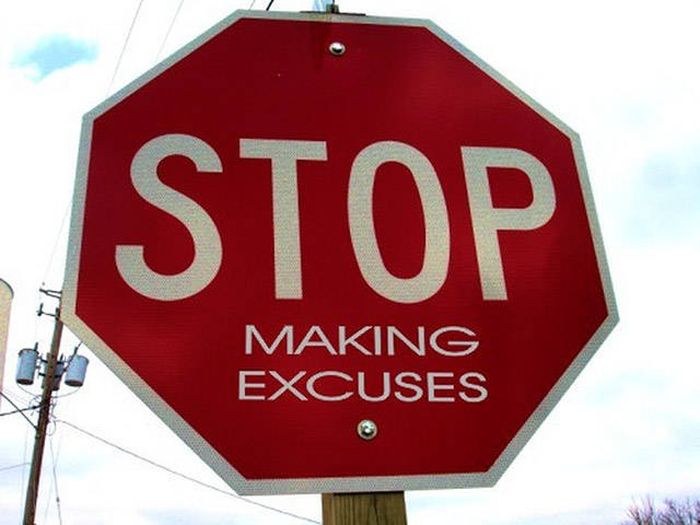Published on November 10, 2014 by David Sack, M.D. in Where Science Meets the Steps If you’re struggling with addiction, you’re not alone. More than 23 million people need treatment for a drug or alcohol problem, according to the Substance Abuse and Mental Health Services Administration, but less than 11 percent are getting it. Are you part of the 89 percent? If so, what’s your story? Have you made legitimate efforts to seek help, or are you making excuses to avoid dealing with the elephant in the room? See if any of these sound familiar:
If you’re struggling with addiction, you’re not alone. More than 23 million people need treatment for a drug or alcohol problem, according to the Substance Abuse and Mental Health Services Administration, but less than 11 percent are getting it. Are you part of the 89 percent? If so, what’s your story? Have you made legitimate efforts to seek help, or are you making excuses to avoid dealing with the elephant in the room? See if any of these sound familiar:
1. It’s too embarrassing to let the whole world know I have a problem
I don’t want people whispering behind my back. What is everyone in my neighborhood and at work going to think if I start going to AA meetings or head off to rehab? And, then, what if I fail? What if I get help and relapse? That would really convince them I’m a loser. First, your problem is probably not the secret you think it is. It’s likely that those closest to you are aware of your issue, whether you are ready to admit to it or not. Their response if you say you are ready to seek help is much more likely to be relief than condemnation. Second, relapse is a possibility for anyone who tries to recover from drug or alcohol addiction and there’s a reason for that: It’s a chronic, relapsing disease. It’s important to go into treatment knowing your progress may be two steps forward, one step back. But with evidence-based treatment, your own commitment and the support of those around you, recovery is possible. Last but not least, struggling with an addiction in no way equates with being a loser. Addiction is a disease, just as cancer or diabetes is, and those dealing with it deserve compassion. It’s hard to find anyone whose life has not been touched by addiction in some way. I’m betting that far from looking down their noses at you, people are much more likely to say, “I know what you are going through.”
2. I can’t afford help
I’m struggling financially as it is. And my insurance is terrible. How am I supposed to afford rehab, or even outpatient care? And what would my family say if I burn through our savings? Maybe one day, if this Obamacare mess gets straightened out and there’s better treatment access, I’ll think about it. But for now, it’s just impossible. How much is your addiction costing you? Aside from the cost of the substance itself, how much does your drug use cost you in time lost from work and life, missed opportunities, related health problems, and damaged relationships? Yes, addiction treatment can be costly, but many facilities offer sliding pay scales to help defray costs and will work with you on payment plans. If you have insurance but it’s not great, the facility can work with your insurance company to maximize your benefits. Alcoholics Anonymous and Narcotics Anonymous meetings are free and can be a good place to start. The Affordable Care Act, or “Obamacare,” is helping by making behavioral and mental health treatment one of the 10 essential benefits required in new insurance policies sold through the exchange and to those on Medicaid, but it is still a work in progress. Change is coming slowly and can vary across regions as health care delivery systems gear up to handle the flow and some states experiment with treatment options. But just because it’s not perfect is no reason not to seek help. It can be painful to use hard-earned money to pay for drug rehab. But would you deny a family member access to potentially life-saving care if they had an illness such as cancer? Addiction is a disease as well, and those who struggle with it are no less deserving of a chance to get better. Far from seeing it as money wasted, I’m guessing those who care about you would consider it a small price to pay to have you sober, engaged – and alive.
3. Life is too hard sober
I’m not doing this because it’s fun. I’m doing this to make it through the day. I’ve been through a lot in my life, and this is the only way I know to cope with the noise in my head. Addiction is often born out of trauma or mental health issues such as depression or anxiety. Drug and alcohol use can become a way to mask the pain. In reality, of course, it’s only adding one more layer to your problems. It’s important that you seek out treatment that addresses co-occurring issues. It can help you understand and learn to deal with what’s going on behind the scenes of your addiction. Once these issues are addressed, coping strategies can emerge and it may no longer seem necessary to turn to drugs or alcohol.
4. I don’t really have a problem
I like getting high. This is me, this is who I am. I pay my bills, I don’t miss work. I am handling this. Besides, I’m no fun sober. Saying that you like what your drug of choice does to you can be another way of saying you’ve tried to stop and failed, so now you are justifying your use. It’s not really a problem if you didn’t really want to quit, right? What you describe as “not a problem” may look very different to those around you. Would your family, spouse or boss agree that you are handling things? Have you missed opportunities, events or commitments because of your drinking or using? Has your drug use had negative consequences, perhaps even legal ones such as DUIs? Or do you feel more likeable when drinking or using drugs? Substance abuse can be a way to mask social insecurity. If you can’t imagine being at a party sober, is it because drugs or alcohol increase the fun or because they make it less painful for you to connect with others? Taking an honest look at why you use can point the way to a life that doesn’t have to depend on substance abuse for its joys.
5. I haven’t hit bottom yet
OK, I know I have some problems, but it’s not like I’m some “Needle Park” junkie. I’m just not ready to get help yet. If I really need to, I will. Besides, what’s the point? If I’m not committed to quitting, what chance do I have? Waiting to hit bottom before you seek help can be deadly. Don’t assume you have to have some “aha” moment before you can make a successful recovery. The desire to change doesn’t have to come before you enter treatment; sometimes treatment can help you get that desire. Research has shown that even people who are ordered into treatment by the courts have just as good a chance of recovery as those who go in fired up to overcome their addictions. So get help skeptically if you must, but get it.




